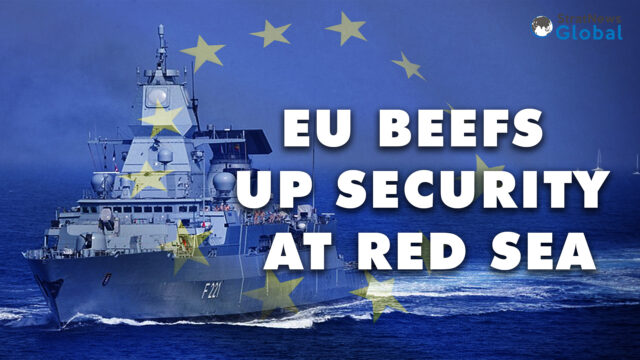Foreign Ministers of the European Union on Monday approved plans to send warships and airborne early warning systems to the Red Sea to protect international ships against attacks by the Houthis in Yemen.
This was confirmed by Italian Foreign Affairs Minister Antonio Tajani, who described it as “an important step towards common European defence” at a meeting of foreign ministers in Brussels, Belgium.
Initially, three European warships and AWACs will be deployed in the region, which includes the Red Sea, the Gulf of Aden and nearby waters as part of mission Aspides, (Ancient Greek word for shield).
“Europe will ensure freedom of navigation in the Red Sea, working alongside our international partners. Beyond crisis response, it’s a step towards a stronger European presence at sea to protect our European interests,” European Commission President Ursula von der Leyen said on X following the decision. Hessen, a German frigate with 240 crew left more than a week ago for the region, with Berlin saying the operation would cover the Red Sea, the Gulf of Aden, the Arabian Sea, the Gulf of Oman and the Persian Gulf and the Straits of Bab al-Mandab and Hormuz.
The Houthis, supported by Iran, have been launching missile and drone attacks on Western ships in the crucial region following Israel’s war in Gaza against the Hamas. British maritime security firm Ambrey said MV Rubymar, a Belize-flagged and UK registered cargo ship was hit by two anti-ship ballistic missiles on Sunday, and was sinking after the crew abandoned ship.
“The ship suffered catastrophic damage and came to a complete halt,” Houthi Spokesperson Yahya Sare’e said. “As a result of the extensive damage the ship suffered, it is now at risk of potential sinking in the Gulf of Aden.”
On February 16, a MT Pollux, a Panamanian flagged ship carrying oil from Russia to India, was attacked by Houthi drones, despite earlier assurances that Russian and Chinese ships would not be targeted.
These attacks have forced shipping companies to avoid the Suez Canal connecting the Mediterranean to the Red Sea, and take the much longer –and more expensive — route around southern Africa.
Due to this re-routing, “delivery times for shipments between Asia and the EU have increased by 10-15 days, and the costs of these shipments have gone up by around 400 per cent”, EU Economy Commissioner Paolo Gentiloni told reporters last week. It has also hit Egypt, with President Abdel Fattah el-Sissi saying on Monday that revenues from the Suez Canal shrunk by “40 to 50 per cent ” so far this year.
Also See:
In a career spanning three decades and counting, Ramananda (Ram to his friends) has been the foreign editor of The Telegraph, Outlook Magazine and the New Indian Express. He helped set up rediff.com’s editorial operations in San Jose and New York, helmed sify.com, and was the founder editor of India.com.
His work has featured in national and international publications like the Al Jazeera Centre for Studies, Global Times and Ashahi Shimbun. But his one constant over all these years, he says, has been the attempt to understand rising India’s place in the world.
He can rustle up a mean salad, his oil-less pepper chicken is to die for, and all it takes is some beer and rhythm and blues to rock his soul.
Talk to him about foreign and strategic affairs, media, South Asia, China, and of course India.





